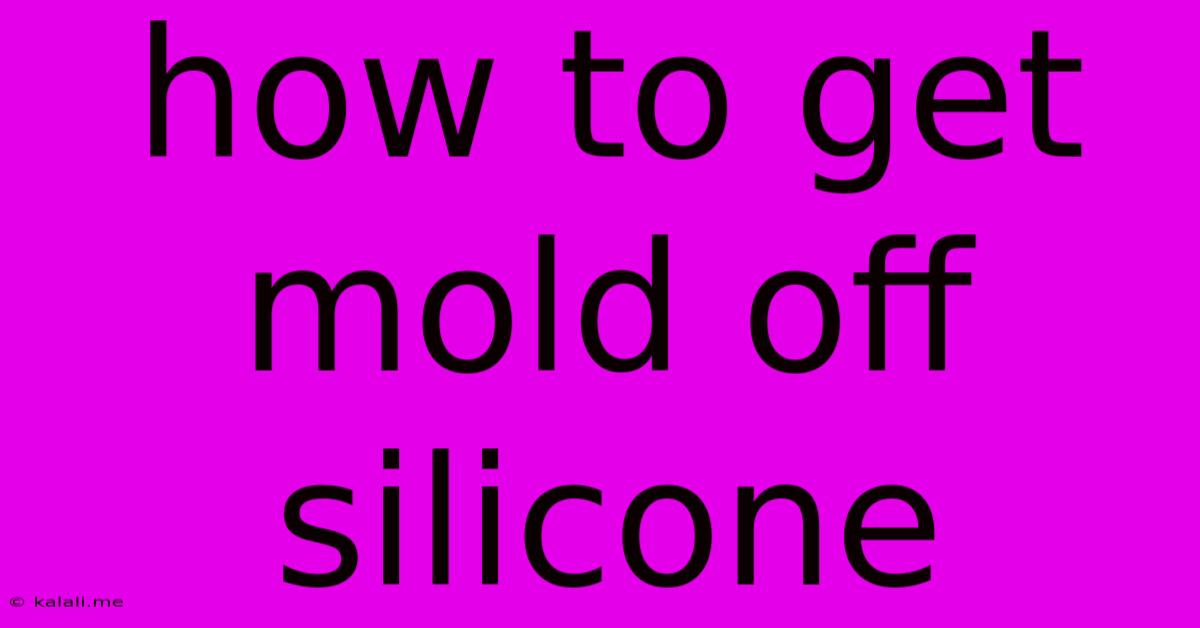How To Get Mold Off Silicone
Kalali
May 19, 2025 · 3 min read

Table of Contents
How to Get Mold Off Silicone: A Comprehensive Guide
Mold growth on silicone products is a common problem, especially in damp environments. Whether it's your silicone baking mat, your phone case, or a bathroom sealant, dealing with mold is crucial for hygiene and the longevity of the item. This guide provides effective methods for removing mold from silicone, focusing on safety and thoroughness. This article covers prevention strategies and various cleaning solutions to tackle different levels of mold infestation.
Understanding Mold on Silicone
Silicone's non-porous nature makes it relatively resistant to mold compared to other materials, but it's not impervious. Mold spores can land on the surface and, given the right conditions (moisture and warmth), begin to grow. The sooner you address mold growth, the easier it will be to remove. Ignoring it can lead to deeper penetration and potential health issues.
Safety First: Protective Gear
Before starting any cleaning process, always prioritize safety. Mold can release spores that are irritating or trigger allergic reactions. Wear protective gear including:
- Gloves: Protect your hands from harsh chemicals and mold spores.
- Mask: A dust mask or respirator will prevent inhalation of spores.
- Eye protection: Safety glasses will shield your eyes from splashes.
Methods for Removing Mold from Silicone
The best method depends on the extent of the mold infestation and the type of silicone item. Here's a breakdown of effective strategies:
1. Mild Mold: Cleaning with Soap and Water
For minor surface mold, a simple cleaning with soap and water is often sufficient.
- Prepare: Mix warm water with a mild dish soap.
- Clean: Use a soft-bristled brush or sponge to gently scrub the affected area.
- Rinse: Rinse thoroughly with clean water and allow the silicone to air dry completely.
2. Moderate Mold: Baking Soda Paste
For more persistent mold, a baking soda paste can be more effective:
- Prepare: Mix baking soda with a small amount of water to create a paste.
- Apply: Apply the paste to the moldy area and let it sit for 15-30 minutes.
- Scrub: Gently scrub the area with a soft brush or sponge.
- Rinse: Rinse thoroughly and air dry.
3. Heavy Mold: Bleach Solution (Use with Caution!)
Bleach is a powerful disinfectant but should be used with caution on silicone, as it can potentially damage or discolor the material. Always test a small, inconspicuous area first.
- Prepare: Mix a diluted bleach solution (1 part bleach to 10 parts water).
- Apply: Apply the solution to the affected area and let it sit for 5-10 minutes.
- Scrub: Gently scrub with a soft brush or sponge.
- Rinse: Rinse extremely thoroughly with clean water and allow the item to air dry completely. Ensure all bleach residue is removed.
4. Isopropyl Alcohol
Isopropyl alcohol (rubbing alcohol) is another effective disinfectant that's generally gentler on silicone than bleach.
- Prepare: Use undiluted isopropyl alcohol (70% or higher concentration).
- Apply: Apply the alcohol to the moldy area with a clean cloth or sponge.
- Scrub: Gently scrub the area.
- Rinse: Allow the alcohol to evaporate completely. No rinsing is usually necessary.
Preventing Mold Growth on Silicone
Prevention is key. To minimize future mold growth:
- Keep it dry: Ensure silicone items are thoroughly dried after each use, especially those used in damp environments.
- Proper storage: Store silicone items in a cool, dry place.
- Regular cleaning: Regularly clean your silicone items to prevent mold buildup.
When to Replace Silicone Items
If mold is deeply embedded or the silicone itself shows signs of deterioration (cracking, discoloration), it's best to replace the item. Mold can penetrate deeper than it may appear, compromising the integrity of the silicone.
By following these methods and preventive measures, you can effectively remove mold from silicone and keep your items clean and safe. Remember to always prioritize safety and choose the appropriate cleaning method based on the severity of the mold infestation.
Latest Posts
Latest Posts
-
Why Is There Only One Tick On Whatsapp
May 19, 2025
-
Steering Wheel Shaking At Higher Speeds
May 19, 2025
-
Can You Use Normal Pans On An Induction Hob
May 19, 2025
-
How Much Juice In 1 Orange
May 19, 2025
-
How To Stop Floors From Creaking Under Carpet
May 19, 2025
Related Post
Thank you for visiting our website which covers about How To Get Mold Off Silicone . We hope the information provided has been useful to you. Feel free to contact us if you have any questions or need further assistance. See you next time and don't miss to bookmark.